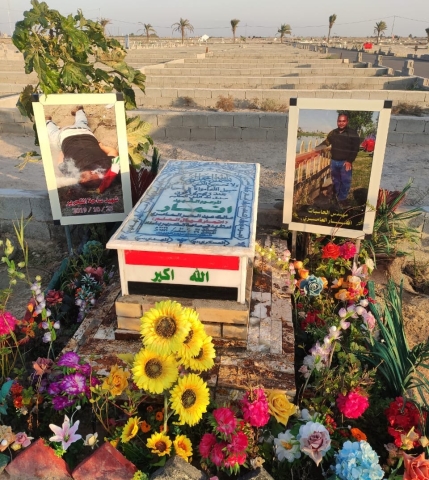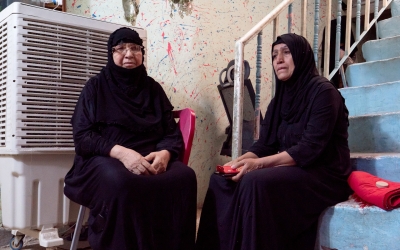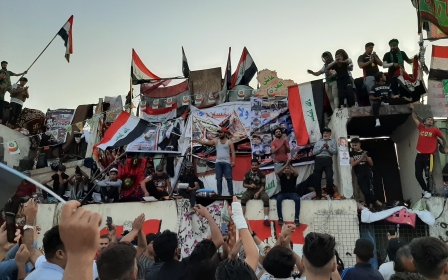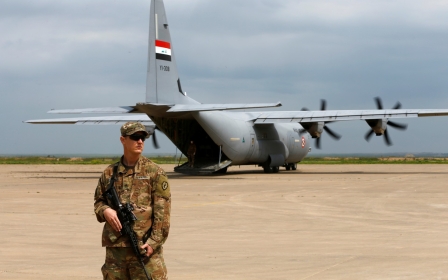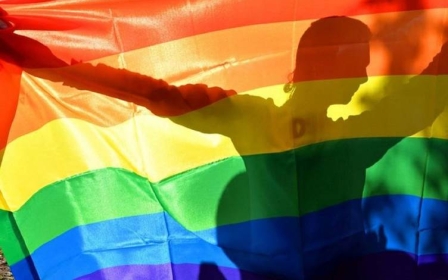Iraq: Activists hopeful in French legal case against former PM Abdul Mahdi
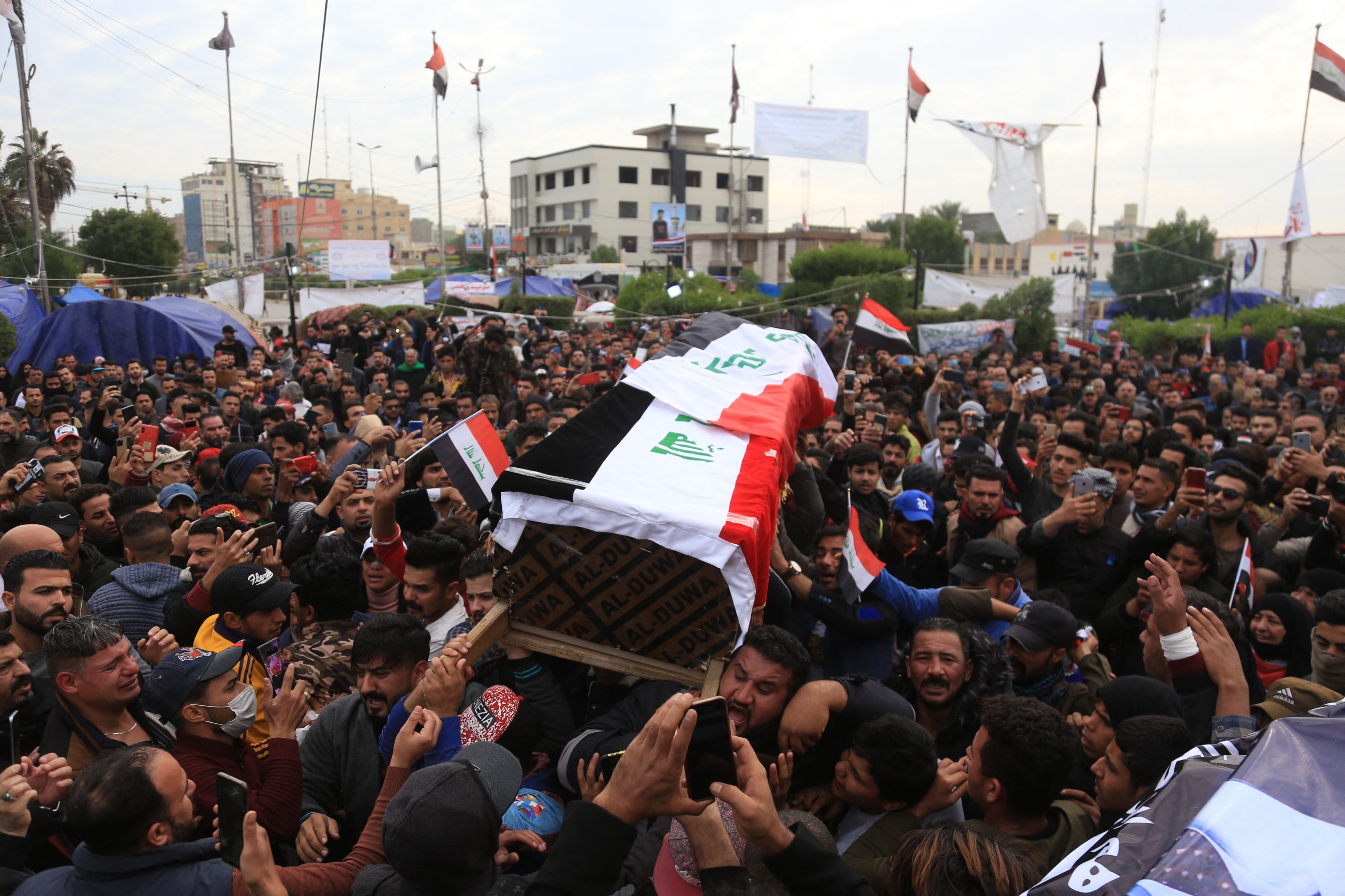
A legal case brought against former Iraqi Prime Minister Adel Abdul Mahdi in France could see anti-government demonstrators find justice for those killed and wounded by armed groups and security services, activists told Middle East Eye.
The case is being brought by French law firm Zimeray & Finelle, representing five victims and the relatives of several hurt or slain during anti-government demonstrations that began in October 2019 over corruption, lack of services and unemployment.
More than 600 people are thought to have been killed and thousands more wounded since the beginning of the protests, which eventually forced Abdul Mahdi's resignation as prime minister in December 2019.
Noor al-Dean was one of those wounded at the height of the protests on 25 October. While protesting in Baghdad's central Tahrir Square, a tear gas cannister struck him, embedding in his neck. The injury left him with paralysis in one hand and in his vocal tendons.
'If we filed a lawsuit against Abdul Mahdi in Iraq, then we will be prosecuted, not him, and this is why we came to the French courts'
- Noor al-Dean, protester
He told Middle East Eye that he and the other plaintiffs did not trust the Iraqi justice system to hold the perpetrators to account.
New MEE newsletter: Jerusalem Dispatch
Sign up to get the latest insights and analysis on Israel-Palestine, alongside Turkey Unpacked and other MEE newsletters
"The judiciary in Iraq is weak and controlled by armed and corrupt militias, and we cannot do anything," he said.
"If we filed a lawsuit against Abdul Mahdi in Iraq, then we will be prosecuted, not him, and this is why we came to the French courts."
Abdul Mahdi is a French citizen, as are his children, and he lived in the country in exile after leaving Iraq in 1969, before returning after the overthrow of former ruler Saddam Hussein in 2003.
In a statement, lawyer Jessica Finelle said the former prime minister had “strong personal links to France, making the Paris court a suitable forum for adjudication".
"The plaintiffs expect a lot from the French courts, starting with the recognition of their victim status," she said.
"This complaint sends a clear message to the Iraqi authorities: international treaties guaranteeing fundamental rights must be universally respected. No serious crime should go unpunished."
'The Iraqi court did nothing'
Another plaintiff, Amir, said he hoped to get justice for his brother Anmar, who was killed by a tear gas canister that struck him in the head while demonstrating on 25 October, 2019.
He told MEE that he had originally attempted to take his brother's case through the Iraqi courts but had been stonewalled, citing the refusal of a forensic team to even issue a death certificate until 60 days had passed.
"The Iraqi court did nothing, no investigation, no witnesses, and the case was shelved," he explained.
He said his brother, a "smart, human and compassionate" man, had only wanted to improve the living standards of Iraqis.
"The young people on 25 October had legitimate demands. My brother wanted to live with dignity," he said.
Previous attempts have been made to hold Iraqi officials accountable for the deaths of protesters through foreign and international courts.
Sweden's Prosecution Office announced in 2019 that it was opening a legal investigation into former defence minister Najah al-Shammari - who holds Swedish citizenship - over his complicity in the crackdown.
The possibility has also been mooted of opening investigations through the International Criminal Court (ICC). Though Iraq is not an ICC member, it would be possible to pursue the numerous officials who hold dual citizenship.
Current Iraqi Prime Minister Mustafa al-Kadhimi has repeatedly stated that he will hold to account members of the security services or militia groups responsible for killing and kidnapping anti-government protesters.
However, beyond the arrest of a handful of relatively low-ranking officials, there has been little progress and activists have become increasingly frustrated.
"Kadhimi did not do anything for us and did not reveal yet who killed us, and the assassinations against the protesters are still continuing," said Dean.
"Kadhimi is only a media man."
Amir concurred, describing him as a "Facebook man" and a vacuous "man of flags".
For Amir, the process of finding justice for his brother has been long and fraught and he is still unsure whether there will ever be a resolution.
He said the pain of Amnar's loss was still with him.
"It is something that cannot be described - a breakdown and a deep sadness. He was not only my brother, he was my friend, was my son. I raised him as a child until he became a man," he said.
"My dearest brother, he was the first to shed his blood for the sake of my country's freedom."
Middle East Eye delivers independent and unrivalled coverage and analysis of the Middle East, North Africa and beyond. To learn more about republishing this content and the associated fees, please fill out this form. More about MEE can be found here.


